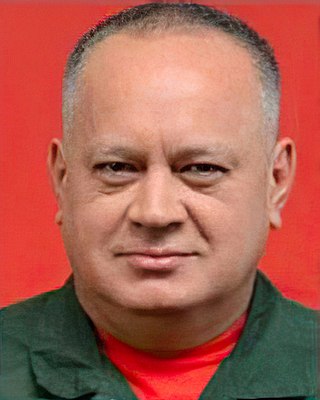
Diosdado Cabello Rondón is a Venezuelan politician who currently serves as Minister of Interior, Justice and Peace since 2024. Cabello is a former member of the National Assembly of Venezuela, where he previously served as Speaker. He is also an active member of the Venezuelan armed forces, with the rank of captain.
The Norte del Valle Cartel, or North Valley Cartel, was a drug cartel that operated principally in the north of the Valle del Cauca department of Colombia, most notably the coastal city of Buenaventura. It rose to prominence during the 1990s, after the Cali and Medellín Cartels fragmented, and it was known as one of the most powerful organizations in the illegal drug trade. The drug cartel was led by the brothers Luis Enrique and Javier Antonio Calle Serna, alias "Los Comba", until its takedown in 2008 by the authorities of Colombia and Venezuela, with cooperation of the United States DEA.

The Bolivarian Forces of Liberation is a communist guerrilla organization operating in Venezuela. The group claims to fight for Bolivarianism, a left-wing, South American ideology. The group was formerly known as the Bolivarian Forces of Liberation – Liberation Army, but they have not attached the suffix to their name in recent years.
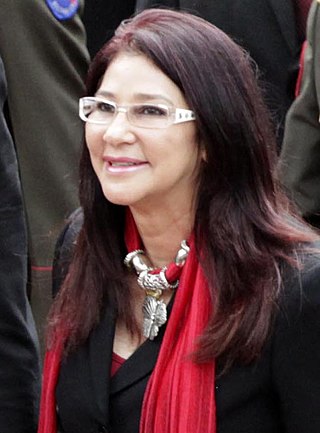
Cilia Adela Flores de Maduro is a Venezuelan lawyer and politician. She is married to the President of Venezuela Nicolás Maduro, making her the First Lady. Since 2015, she has also been a deputy in the National Assembly of Venezuela, of which she was president from 2006 to 2011, for her home state of Cojedes. In 2017, the Constituent National Assembly was founded, in which she is a member of the Presidential Commission.
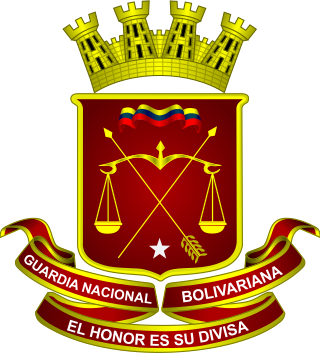
The Bolivarian National Guard of Venezuela, is a gendarmerie component of the National Armed Forces of Venezuela. The national guard can serve as gendarmerie, perform civil defense roles, or serve as a reserve light infantry force. The national guard was founded on 4 August 1937 by the then President of the Republic, General-in-Chief Eleazar López Contreras. The motto of the GNB is "El Honor es su divisa", slightly different from the motto of the Spanish Civil Guard "El Honor es mi divisa".
Ramón Rodríguez Chacín is a Venezuelan politician. A retired naval officer, he was Minister of the Interior and Justice in 2002, and again in 2008. He took part in the November 1992 coup attempt.
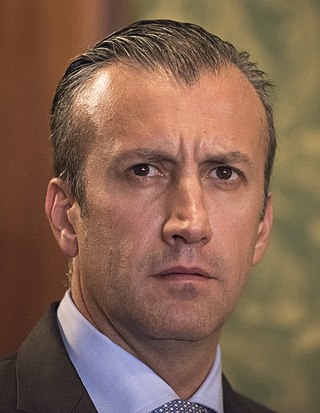
Tareck Zaidan El Aissami Maddah is a Venezuelan politician, who served as the vice president of Venezuela from 2017 to 2018. He served as Minister of Industries and National Production since 14 June 2018, and as Minister of Petroleum from 27 April 2020 until 20 March 2023. He previously was Minister of the Interior and Justice from 2008 to 2012, Governor of Aragua from 2012 to 2017, and the vice president of Venezuela from 2017 to 2018. While holding that office, El Aissami faced allegations of participating in corruption, money laundering and drug trafficking. In 2019, U.S. Immigration and Customs Enforcement (ICE) added El Aissami to the ICE Most Wanted List, listed by the Homeland Security Investigations unit. El Aissami, who was among the power brokers in Nicolás Maduro's government, resigned on 20 March 2023 during a corruption probe. He was arrested by the Venezuelan prosecutor's office on charges of treason, money laundering and criminal association.
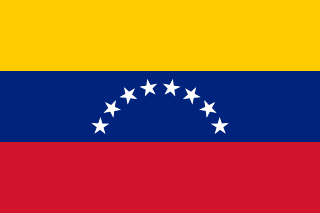
The level of corruption in Venezuela is very high by world standards and is prevalent throughout many levels of Venezuelan society. Discovery of oil in Venezuela in the early 20th century worsened political corruption. The large amount of corruption and mismanagement in the country has resulted in severe economic difficulties, part of the crisis in Venezuela. A 2014 Gallup poll found that 75% of Venezuelans believed that corruption was widespread throughout the Venezuelan government. Discontent with corruption was cited by demonstrators as one of the reasons for the 2014 and 2017 Venezuelan protests.
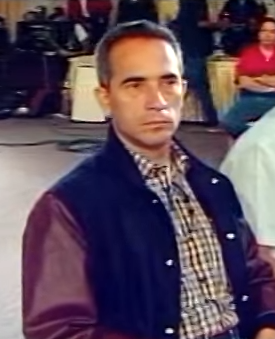
Freddy Alirio Bernal Rosales is a Venezuelan politician. He served as mayor of the Libertador Municipality in Caracas and is a member of the United Socialist Party of Venezuela (PSUV).
Illegal drug trade in Venezuela is the practice of illegal drug trading in Venezuela. Venezuela has been a path to the United States for cocaine originating in Colombia, through Central America and Mexico and Caribbean countries such as Haiti, the Dominican Republic, and Puerto Rico. In the 2010s, Venezuela also gradually became a major producer of cocaine.
Crime in Venezuela is widespread, with violent crimes such as murder and kidnapping increasing for several years. In 2014, the United Nations attributed crime to the poor political and economic environment in the country—which, at the time, had the second highest murder rate in the world. Rates of crime rapidly began to increase during the presidency of Hugo Chávez due to the institutional instability of his Bolivarian government, underfunding of police resources, and severe inequality. Chávez's government sought a cultural hegemony by promoting class conflict and social fragmentation, which in turn encouraged "criminal gangs to kill, kidnap, rob and extort". Upon Chávez's death in 2013, Venezuela was ranked the most insecure nation in the world by Gallup.
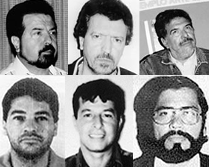
Drug barons of Colombia refer to some of the most notable drug lords which operate in illegal drug trafficking in Colombia. Several of them, notably Pablo Escobar, were long considered among the world's most dangerous and most wanted men by U.S. intelligence. "Ruthless and immensely powerful", several political leaders, such as President Virgilio Barco Vargas, became convinced that the drug lords were becoming so powerful that they could oust the formal government and run the country.
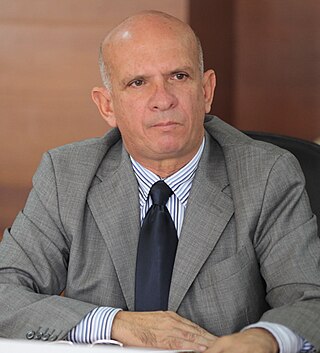
Hugo Armando Carvajal Barrios, nicknamed El Pollo, is a Venezuelan diplomat and retired general. He was the head of the military intelligence in Venezuela during Hugo Chávez's government, from July 2004 to December 2011. Carvajal was arrested in Spain on 12 April 2019 based on an arrest warrant from the United States for 2011 drug trafficking charges; the U.S. asked Spain to extradite Carvajal. After the Spanish courts approved his extradition to the United States Carvajal went into hiding. On 26 March 2020, the U.S. Department of State offered $10 million for information to bring him to justice in relation to drug trafficking and narco-terrorism. On 9 September 2021 he was arrested by Spanish police in an apartment in Madrid. On 19 July 2023, Carjaval was extradited to the United States.
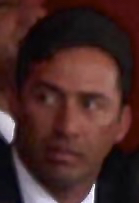
Leamsy José Salazar Villafaña is an ex-lieutenant colonel in the Venezuelan Navy who was also the head of security details for Hugo Chávez and Diosdado Cabello. Salazar defected to the United States in December 2014 with the assistance of the United States Drug Enforcement Administration providing allegations of Diosdado Cabello heading an organization involved in international drug trade known as the Cartel of the Suns.

The Narcosobrinos affair is the situation of events that surrounded two nephews of Venezuelan President Nicolás Maduro and his wife Cilia Flores who were arrested for narcotics trafficking. The nephews, Efraín Antonio Campo Flores and Francisco Flores de Freitas, were arrested on 10 November 2015 by the United States Drug Enforcement Administration in Port-au-Prince, Haiti after attempting to transport 800 kilograms of cocaine into the United States. A year later on 18 November 2016, the two nephews were found guilty, with the cash allegedly destined to "help their family stay in power". On 14 December 2017, the two were sentenced to 18 years of imprisonment.

The United States of America v. Efrain Antonio Campo Flores and Franqui Francisco Flores de Freitas was a court case surrounding two nephews of Venezuelan President Nicolás Maduro, Efraín Antonio Campo Flores and Francisco Flores de Freitas, who were found guilty of attempting to transport 800 kilograms of cocaine into the United States.

Defections from the Bolivarian Revolution occurred under the administrations of Presidents Hugo Chávez and Nicolás Maduro. The 2019 Venezuelan presidential crisis concerning who is the legitimate President of Venezuela has been underway since 10 January 2019, when the opposition-majority National Assembly declared that incumbent Nicolás Maduro's 2018 reelection was invalid and the body declared its president, Juan Guaidó, to be acting president of the nation. Guaidó encouraged military personnel and security officials to withdraw support from Maduro, and offered an amnesty law, approved by the National Assembly, for military personnel and authorities who help to restore constitutional order.
Jesús Rafael Suárez Chourio is a Venezuelan military officer who served as the General Commander of the Bolivarian Army of Venezuela from 20 June 2017 until 8 July 2019.
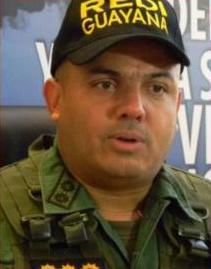
Cliver Antonio Alcalá Cordones, is a retired Venezuelan major general and a member of the Bolivarian Army. Alcalá was one of the soldiers who participated in the attempted coup d'état against President Carlos Andrés Pérez in February 1992, and served as chief of garrison in the cities of both Valencia and Maracay, and finally as general commander of the Integral Defense Region in Guayana (REDI-Guayana). Alcalá Cordones was discharged from the Army on 5 July 2013 during the presidency of Nicolás Maduro.
The governments of Hugo Chávez and Nicolás Maduro have provided economic, political and military support to the Revolutionary Armed Forces of Colombia (FARC-EP) and the National Liberation Army (ELN). The support of Colombian leftist guerrillas has continued during the government of Nicolás Maduro. By 2018, the investigative group InSight Crime reported that the ELN operated in at least 12 of Venezuela's 23 states. The Venezuelan NGO Fundación Redes (Fundaredes) in 2018 documented more than 250 reports of Venezuelans who were victims of recruitment by Colombian irregular groups. Recruitment has also been denounced by Colombian media.















